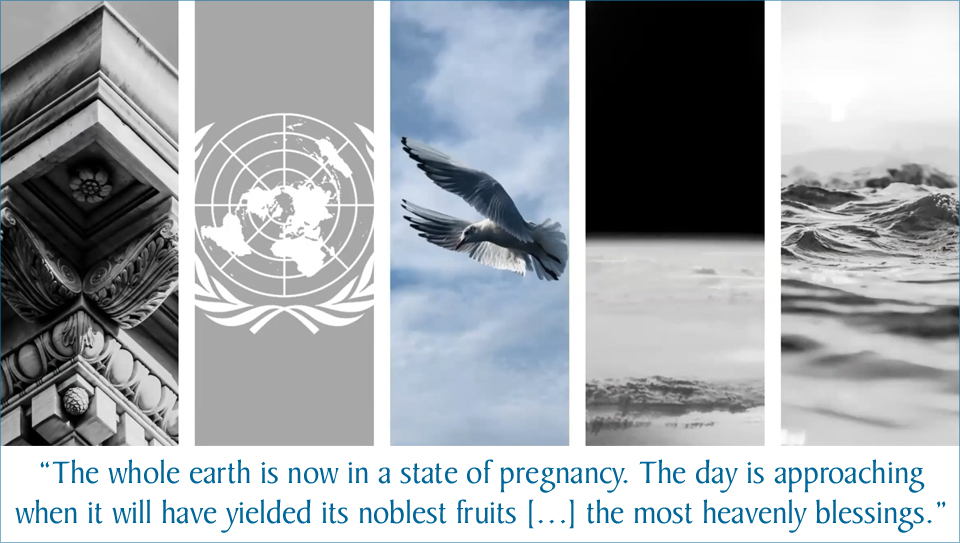 |
 |
|
January 29, 2022 The River Flows to the Sea: Creating Enduring Peace The world's equilibrium hath been upset through the vibrating influence of this most great, this new World Order. Mankind's ordered life hath been revolutionized through the agency of this unique, this wondrous System – the like of which mortal eyes have never witnessed. Immerse yourselves in the ocean of My words, that ye may unravel its secrets…. — Bahá’u’lláh, The Kitáb-i-Aqdas (Most Holy Book) 
December’s “Big Ideas” presentation by lawyer and doctoral student Michael Sabet, was among the most outstanding of this series of talks linking the Bahá’í Revelation to the urgent topics of today. Titled “Justice, Unity, and the Path to World Order”, Sabet’s online lecture was delivered to nearly sixty devices. Dense and illuminating, it reflected also on the history and future of the United Nations, the Bahá’í International Community (BIC), and on the approach of both to the critical issue of human rights. “There’s always been a world order of some kind,” Sabet began, but the relationship among sovereign states and empires is anarchic when might makes right is the dominant principle and confusion reigns. The Bahá’í view is that history, however, is teleological, that is, with direction and purpose: “All men have been created to carry forward an ever-advancing civilization,” wrote Bahá’u’lláh, the Founder of the Bahá’í Faith, also offering this analogy: “The whole earth is now in a state of pregnancy. The day is approaching when it will have yielded its noblest fruits […] the most heavenly blessings.” But history is immensely complex, with no straight line tracing an “ever-advancing civilization.” Sabet suggests that we view history as a river: it has an eventual destination, but traverses chaotic rapids, sluggish backwaters and endless curves. Correspondingly, it is hard to track the movement towards world order, and we can’t assume that current arrangements are final. We can, though, choose to align ourselves with processes that lead to greater justice and order. As the Universal House of Justice, governing council of the international Bahá’í community, wrote in 2019: “The
unification of humanity is unstoppable by any human force…. Yet
the course humanity takes to achieve its destiny may very well be
tortuous […] until a chastened humanity sees fit to take another
significant step, perhaps this time decisive, towards enduring peace.”
One such step is the United Nations. The19th-century powers were bent
on nation- and empire-building, and alliances among them made the Great
War of 1914-18 inevitable; the League of Nations formed in its brutal
aftermath couldn’t prevent a second World War that killed tens of
millions of civilians. While more effective and better constructed than
the League, the veto power of the five UN Security Council nations is
one obvious weakness. Sabet persuasively argues that the League and the
United Nations should be regarded as useful movements towards a global
order.
By 1948, the UN had produced the Universal Declaration of Human Rights (UDHR) and developed an institutional apparatus around it. Since 2002, the International Criminal Court has enforced human rights under certain conditions. These “negative rights” define what the state cannot do (arbitrary detention, genocide, etc.). However, “state sovereignty remains more or less supreme”, says Sabet. Interestingly, the Bahá’í International Community (BIC), a non-governmental organization also formed in 1948, has become a valued contributor to the UN’s consultations. As Julia Berger writes, the BIC is “contributing, however modestly, to the collective long-term enterprise of strengthening the international community’s capacity to exercise justice.[1]” The BIC views the UN as an agency that is developing, learning from its missteps, and growing in capacity, and seeks to support it. Michael Sabet ended by discussing how individualism and spirituality affect human rights discourse. Enforcing the UDHR remains a problem, but its moral force is real. However, the rise of economic individualism in the late 20th century separated human rights from how people actually live, thereby limiting its scope. Conversely, the Bahá’í vision – “the purpose of justice is the appearance of unity among men”, Bahá’u’lláh wrote – elevates human rights beyond merely protecting citizens from state tyranny. ‘Abdu’l-Bahá, His son, explained that “the family is a state in miniature”. Families seek not only to avoid paternal cruelty, for example, but to become havens of love and cooperation, where “the injury of one shall be considered the injury of all; the comfort of each, the comfort of all; the honour of each, the honour of all.” Bahá’ís strive to model this ideal in their worldwide communities, and the BIC advocates for it internationally, insisting that the foundation of human rights is spiritual dignity and universal love. Without them, materialistic calculations can permit the excuse that “the ends justify the means”, which results in there being no absolute basis for human rights. National pledges, or emphasizing the material advantages of preserving human rights, are insufficient, said Sabet. The “inherent dignity” and “inalienable rights of all members of the human family” in the UDHR are, ultimately, based upon the ancient principle that human beings are created in the image of God. This, alongside Bahá’u’lláh’s proclamation of the oneness of humanity – no pious hope, but a statement of reality – is a sure foundation for human rights, peace, and a world order based on justice and love. [1] Rethinking Religion and Politics in a Plural World, Julia Berger, 2021 |
|
|